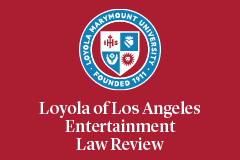Abstract
The Ninth Circuit temporarily stunned marketers in 2011 when it ruled that Betty Boop did not serve as a trademark on merchandise due to aesthetic functionality and because protection would conflict with the copyright system. The opinion endangered merchandising rights in all trademarks and jeopardized the duration of trademark rights in images and media characters. The court soon withdrew the decision and substituted it with one that denied protection on technical grounds, leaving the controversies for another day. This article demonstrates that the court’s apprehension about copyrights made sense, and proposes a new approach to distinguish when copyrighted images might also serve as trademarks.
Recommended Citation
Lee B. Burgunder,
The Scoop on Betty Boop: A Proposal to Limit Overreaching Trademarks,
32 Loy. L.A. Ent. L. Rev. 257
(2012).
Available at: https://digitalcommons.lmu.edu/elr/vol32/iss3/1



